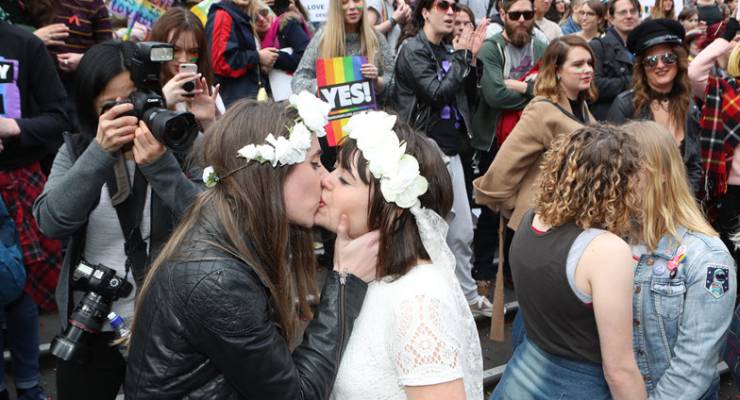
For neither the first nor the last time this year, all eyes will be on the High Court next week, as it considers the constitutional merits of the government’s bid to dress up its same-sex marriage plebiscite as an Australian Bureau of Statistics survey without the endorsement of Parliament.
Among those who don’t like the government’s chances are George Williams, constitutional law expert and dean of the University of New South Wales law faculty (and one-time Labor preselection aspirant), who told the National Press Club on Wednesday he would be “surprised” if the court saw things the government’s way.
Even if Williams is proved right, one legacy of the endeavour will remain — an unusual mid-term surge in electoral enrolment that has had a measurable impact on the demographic profile of the prospective voting population.
As a headline in BuzzFeed put it last week, Liberals were “privately shitting themselves” at the thought of a replay of the British election in June, when the established order was up-ended by a surge of activity among the hitherto apathetic youth.
The Australian Electoral Commission added some meat to these bones on Wednesday with an announcement that 933,592 “enrolment transactions” had been processed between the announcement of the survey and last Friday’s enrolment deadline, which impressively compares with 687,000 during the close-of-rolls period at last year’s federal election (albeit that this compares a two-and-a-half week period with a one-week period).
[Rundle: if we have to have this plebiscite, we have to win it]
While only 98,000 of these transactions were new enrolments, as distinct from updates (in most cases changes of address), 65,000 of them were among those aged 18 to 24.
Under-enrolment among the young is a perennial issue with management of the electoral roll, and this influx constitutes a substantial improvement.
The AEC estimated 14.6% of the 18-to-24 population was missing from the roll as of June 30, which would now appear to have dropped to 11.4%, compared with a change from 4.9% to 4.1% among the population as a whole.
While many of the new enrolees would no doubt have found their way to the roll before the next election in any case, it’s notable that the upsurge has more than accounted for the drift since the previous surge of enrolment activity at last year’s election, at which time the youth under-enrolment rate was 13.2%.
If nothing else, this can be seen as further evidence of an energised “yes” campaign to add to the findings of two opinion polls last week that same-sex marriage supporters were more likely to participate in the survey than opponents.
But so far as the next election is concerned, the impact of the enrolment surge should be kept in perspective.
Even after the last few weeks of activity, the 18-to-24 population still only accounts for 10.6% of the electoral roll, compared with 10.3% a few weeks ago.
On the most generous accounting, this could give Labor an advantage of a few hundred voters per electorate — rarely enough to make a difference in even a single seat.
Certainly the efforts of Tony Abbott and other “no” campaigners are doing the Liberal Party no favours among the young, but that damage had already been done by Abbott’s prime ministership.
[Youth media push AEC enrolment]
Indeed, polls suggest it’s actually older voters who have been deserting the Coalition in the greatest numbers since the last election, in large part because this is where One Nation has been drawing the bulk of their support.
So while young voters appear to be enthused at the prospect of participating in even a flawed act of direct democracy, engagement with major party politics will only follow if Labor offers them something tangible.
New Zealand’s Labour Party sought to do that just on Wednesday with a free tertiary education promise that took a leaf straight out of Jeremy Corbyn’s book.
However, that was in the context of a finely balanced election campaign held under voluntary voting, in which a surge of enthusiasm among the young could potentially make all the difference.
As he surveys his commanding opinion poll lead over a government that appears to have no idea how to turn things around, there is little chance that Bill Shorten will feel inspired to take a similar risk.








Crikey is committed to hosting lively discussions. Help us keep the conversation useful, interesting and welcoming. We aim to publish comments quickly in the interest of promoting robust conversation, but we’re a small team and we deploy filters to protect against legal risk. Occasionally your comment may be held up while we review, but we’re working as fast as we can to keep the conversation rolling.
The Crikey comment section is members-only content. Please subscribe to leave a comment.
The Crikey comment section is members-only content. Please login to leave a comment.